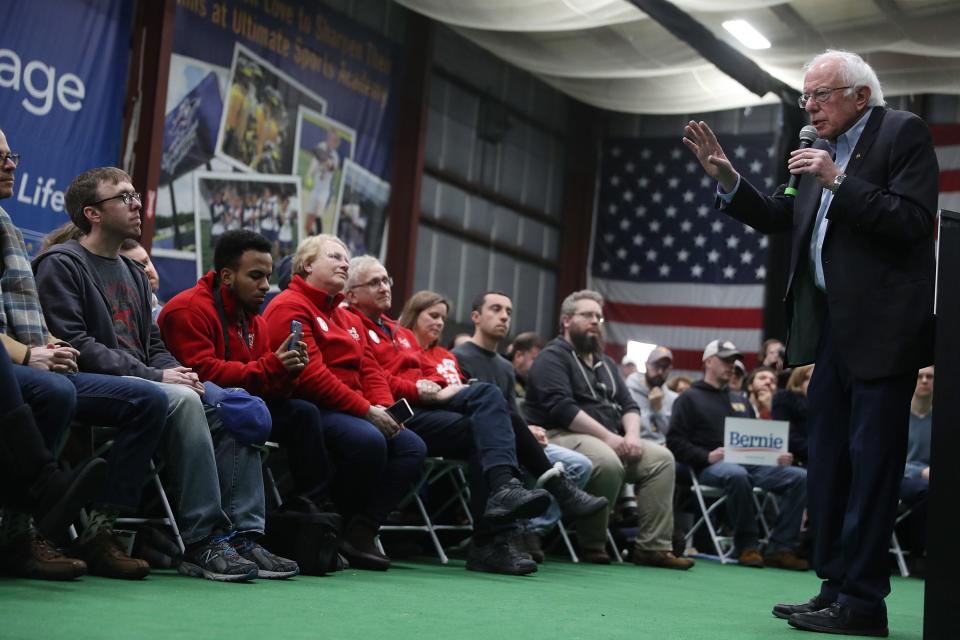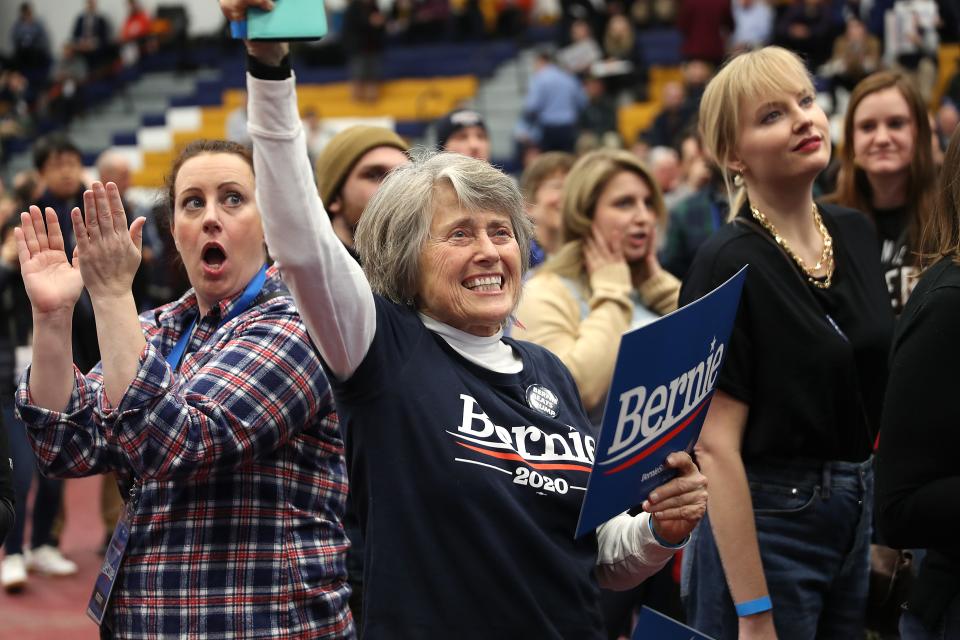Analysis: Joe Biden insists he has a path to the nomination, but others have trouble seeing it
Joe Biden insists he has a path to the presidential nomination. Others are having trouble seeing it.
The former vice president was the field's front-runner until voters started casting ballots. A disappointing fourth-place finish in the opening Iowa caucuses last week was followed by a disastrous fifth-place finish in the New Hampshire primary Tuesday. The collapse of his support into single digits will not only make raising money and rallying supporters more difficult, it also raises questions about whether his campaign can survive until the Super Tuesday contests three weeks away.
"It ain't over, man; we're just getting started," Biden told a campaign crowd in Charleston, South Carolina, where he headed instead of staying in New Hampshire. He struck a deliberately upbeat tone, emphasizing his commitment to African American and Latino concerns and noting the lack of racial diversity in the two states that have voted. "Where I come from, that's the opening bell, not the closing bell, and the fight to end Donald Trump's presidency is just beginning, just beginning."
That said, if Biden doesn't score a convincing win in the South Carolina primary Feb. 29 – not impossible but a challenge – his third bid for the presidency could be effectively over, and with it a career in elective office that spanned six decades.
‘I'll probably take a hit here': Biden faces big test in New Hampshire

Vermont Sen. Bernie Sanders was riding high after carrying the popular vote in Iowa (although not the delegate count) and winning New Hampshire (although with a smaller margin than his landslide over Hillary Clinton four years ago). Former South Bend, Indiana, Mayor Pete Buttigieg was a solid second, and Minnesota Sen. Amy Klobuchar parlayed a strong showing in the candidate debates into a surprising third-place finish. Massachusetts Sen. Elizabeth Warren was a distant fourth, and Biden finished even lower.
In modern times, no candidate in either party has been nominated for president after a start as faltering as that. All but one of the nominees won either in Iowa or New Hampshire. (The exception was in 1992, when Iowa wasn't contested and Bill Clinton sold his second-place finish in New Hampshire as a victory by the "comeback kid.")
This time, Biden's calculation is that the Democratic race is so unsettled – and Sanders, a self-described democratic socialist, would be such a risky nominee – that history's lessons won't apply.
Registered to vote? Check your status here
A month ago, he led the field in New Hampshire, according to the RealClearPolitics average of statewide polls. That standing evaporated not because of a spectacular mistake but because of a mediocre campaign, overtaken by newer candidates with greater vigor. The relentless attacks by President Donald Trump on Biden and his son Hunter on unproven allegations of corrupt behavior in Ukraine didn't help.
Biden's transactional appeal to voters, once his strength, is his vulnerability.
From the start, the fundamental premise of Biden's campaign has been that he was the most electable candidate, best able to defeat Trump in November. The problem is that the way to demonstrate electability is to win, and he hasn't, at least not yet.
The early losses have eroded confidence in the bargain he offered. Before the Iowa caucuses, 44% of those surveyed in a national Quinnipiac University Poll said Biden had the best chance of beating Trump. In a poll released Monday, that number plummeted to 27%, only a bit higher than Sanders, at 24%.
'I have a Beau, too'
When Biden spied two little boys squirming in the front row at a rally in downtown Manchester, he walked over with his handheld microphone to ask their names and hold out the promise of ice cream after the politics was done. One boy said his name was Keith. The other? "Beau."
Biden looked taken aback for an instant, and the crowd of several hundred people seemed to hold its collective breath. Then he said quietly, "I have a Beau, too" and moved back to center stage.
Just about everybody in the Rex Theater knew that the death of Beau Biden in 2015 from a malignant brain tumor prevented his grieving father from running for the Democratic presidential nomination in 2016. Four years later, Joe Biden's bid for the White House has taken on almost an elegiac air.
He has been dubbed "Uncle Joe," a nickname that suggests familiarity and perhaps eye-rolling exasperation. Voters say they like him and respect his service, but some see him as a figure from a different era, shaped by the politics of the past.
"It just seems his time has passed," said Camille Brown, 62, of Nashua, New Hampshire, the director of admissions at a community college who attended a candidate forum in Concord. "It's time to pass the mantle."
"Thank you for your service," her husband, Barry, 61, said – praise but with a sharpened point.

Who's running for president: An interactive guide to the candidates
Candidates on the issues: Voter's guide to where they stand on health care, gun control and more
Biden was 29 years old when he was elected to the U.S. Senate from Delaware in 1972, for the first of six terms. Now he is 77, in good health but looking his age. He does fewer campaign events on an average day than Sanders, who is 78, and he doesn't display the fist-pumping energy of Warren, who is 70.
Klobuchar is 59, and Buttigieg just turned 38 – younger than any of Biden's children.
John Lynch, a former four-term New Hampshire governor and Biden supporter, said he was surprised by Biden's decline and acknowledged Buttigieg's appeal. "He's a new face and not from Washington," Lynch said as he waited for Biden to arrive at the Manchester rally. "Oftentimes people are attracted to somebody new."
The Obama primary
Facing the prospect of a bad night in New Hampshire, Biden decided to get out of town, ditching announced plans to attend a "victory party" in Nashua and heading to South Carolina for an event featuring Rep. Cedric Richmond, D-La., co-chairman of his campaign. Friday and Saturday, Biden is scheduled to campaign in Nevada, which will hold its caucuses Feb. 22.
Biden's strategists have long described the South Carolina primary as his firewall, noting his strength among more racially diverse electorates. But the dynamics from one contest ripple through the others. Just ask Hillary Clinton, who saw her lead in South Carolina evaporate once Barack Obama won in Iowa in 2008. She ended up being swamped in the state's primary.
The most worrisome trend for Biden in the poll may have been the slide in his support among black voters, although the sample size was small. Biden's standing with African Americans dropped to 27% from 49% in a poll last month. Former New York Mayor Mike Bloomberg was close behind at 22%, and Sanders was at 19%.
Biden's appeal to black voters has been based in part on his association with Obama, but he isn't the only candidate touting his ties to the last Democratic president. Warren aired an ad that shows Obama praising her work on consumer protection issues, and Bloomberg runs a spot that shows Obama praising him for "pragmatic solutions" on education and gun violence.
After South Carolina's primary, on the last Saturday of the month, the calendar is unforgiving. Three days later is Super Tuesday, a behemoth of a primary day with contests in California and Texas and a dozen other states. By then, the campaign imperative shifts from greeting voters at diners to spending millions of dollars to air TV ads.
Let's vote: When are the 2020 presidential election primaries?
Millions of dollars is what Bloomberg has; the billionaire is willing to invest an unprecedented amount of his own fortune in the campaign. He has outspent the rest of the field combined. The Republican-turned-Democrat skipped the first four contests, planning to jump in on Super Tuesday March 3. He pitches himself as a pragmatic centrist – as does Biden – and his strategy counts on Biden stumbling out of the way.
At the moment, that seems like a reasonable bet.
This article originally appeared on USA TODAY: Biden: New Hampshire, Iowa losses raise questions on campaign's future

